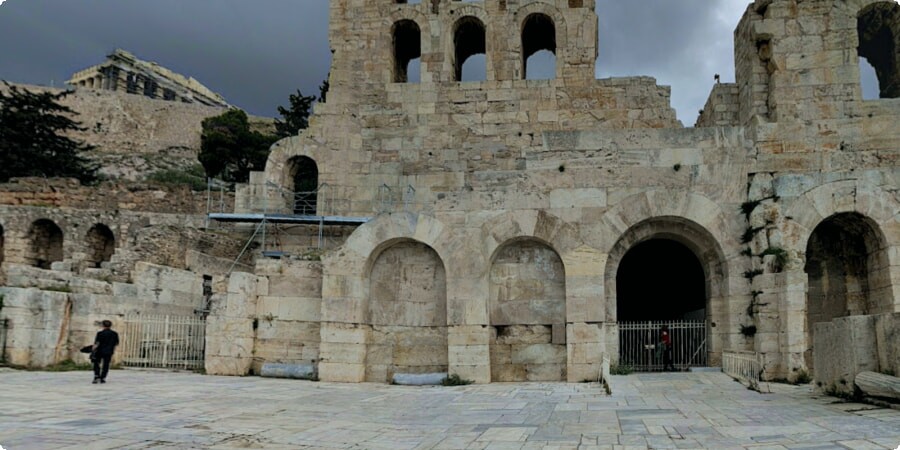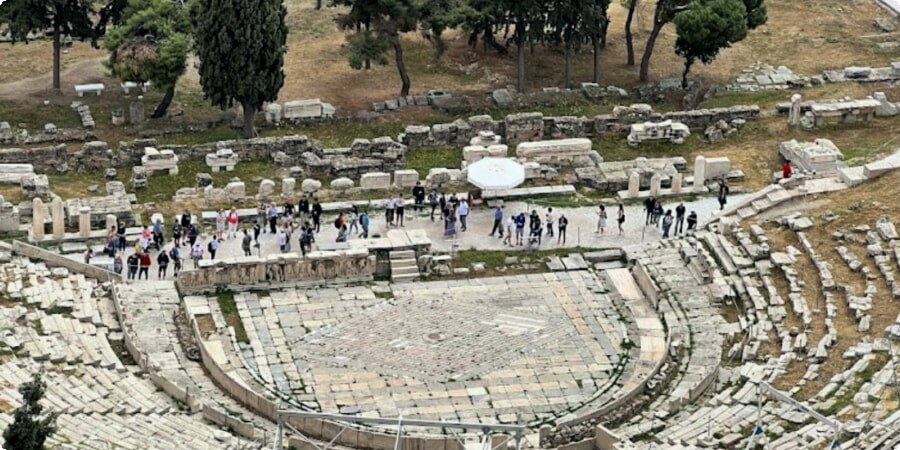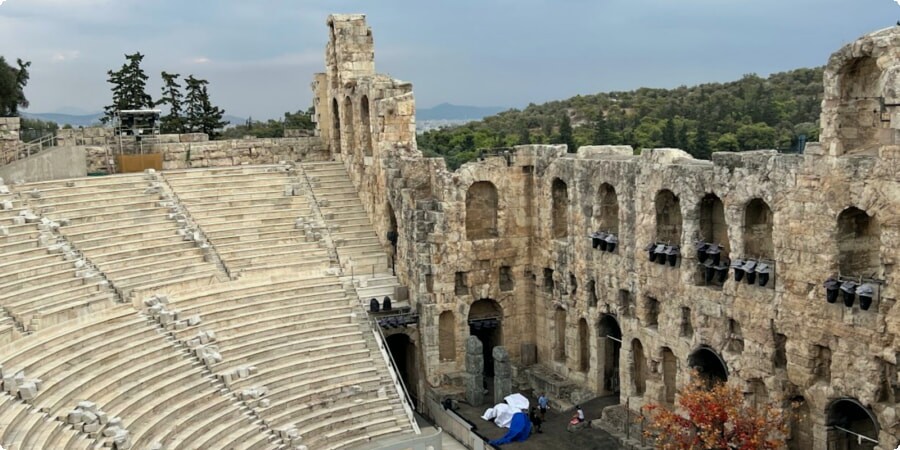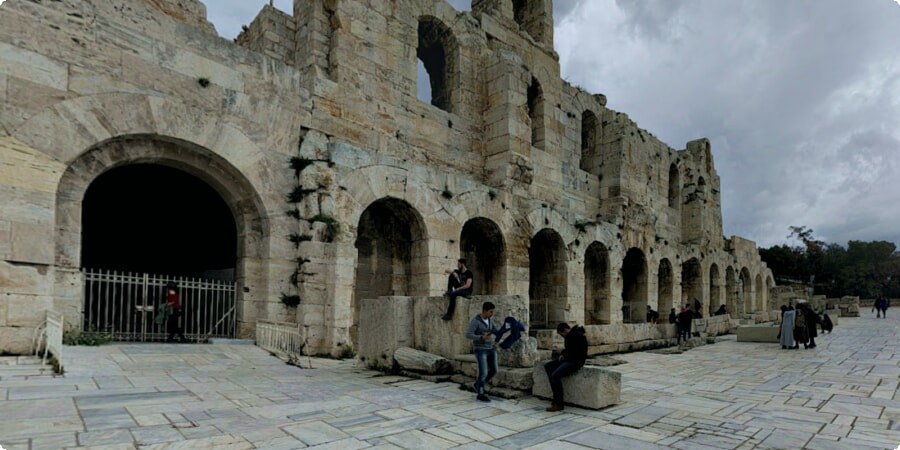Standing Amongst Ruins: The Timeless Beauty of the Theater of Dionysus
Welcome to the Theater of Dionysus, a place where time stands still, and the echoes of ancient drama still reverberate through the stones. Nestled at the foot of the Acropolis in Athens, Greece, this ancient theater holds within its weathered walls centuries of history, culture, and artistic expression. As you stand amidst the ruins of this once-grand amphitheater, you can't help but feel a sense of awe at the enduring legacy of Greek theater and the timeless beauty of this historic site.
History and Evolution
The Theater of Dionysus has a storied history that stretches back to the dawn of Western civilization. Originally built in the 6th century BCE as a simple wooden structure, the theater underwent several renovations and expansions over the centuries, eventually evolving into the magnificent stone amphitheater that we see today. Named in honor of Dionysus, the Greek god of wine, fertility, and theater, the theater played a central role in the religious and cultural life of ancient Athens.
Over the centuries, the Theater of Dionysus hosted countless performances of Greek tragedy and comedy, captivating audiences with its powerful storytelling and theatrical spectacle. Playwrights such as Aeschylus, Sophocles, and Euripides premiered their works on its stage, leaving an indelible mark on the history of drama and literature.
Architectural Features
As you explore the ruins of the Theater of Dionysus, you can't help but marvel at the architectural ingenuity of its ancient builders. Carved into the rocky slope of the Acropolis, the theater boasts a semicircular seating arrangement, with tiered stone benches that offered seating for up to 17,000 spectators. At the center of the theater stands the orchestra, where the chorus and actors performed against the backdrop of the skene, or stage building.

The theater's stage area, known as the proscenium, was adorned with elaborate decorations and sculptures, including statues of Greek gods and heroes. Behind the stage, the skene featured painted backdrops and architectural facades that served as the backdrop for performances. Today, only a few scattered remnants remain of these once-magnificent structures, but they offer a tantalizing glimpse into the theater's former glory.
Learn more about the Theater of Dionysus on Wikipedia
Explore the Theater of Dionysus on Google Maps
Planning a trip to Corfu? Discover the best hotels for your stay through this link: Best Hotels in Corfu
Cultural Significance
The Theater of Dionysus stands as a testament to the cultural significance of theater in ancient Greece. In addition to being a venue for dramatic performances, the theater played a central role in the celebration of the Dionysian festivals, honoring the god of wine and fertility. These festivals were a time of revelry and religious devotion, with theatrical competitions, processions, and sacrifices held in honor of Dionysus.
The plays performed at the Theater of Dionysus were not merely entertainment—they were a reflection of the values, beliefs, and struggles of Athenian society. Tragedies explored themes of fate, justice, and the human condition, while comedies satirized politics, society, and the foibles of everyday life. The theater served as a forum for intellectual debate and artistic expression, fostering a sense of community and shared identity among the citizens of Athens.

Notable Performances and Playwrights
Throughout its long history, the Theater of Dionysus played host to some of the greatest performances and playwrights of antiquity. The works of playwrights such as Aeschylus, Sophocles, and Euripides were premiered on its stage, shaping the course of Western literature and drama for centuries to come.
One of the most famous performances in the theater's history was the premiere of Sophocles' tragedy "Oedipus Rex," a timeless tale of fate, prophecy, and the search for truth. The play's gripping storyline and powerful themes captivated audiences then as they do today, cementing its place as a masterpiece of Greek theater.
Rediscovery and Restoration
After centuries of neglect and obscurity, the Theater of Dionysus was rediscovered and restored in the 19th and 20th centuries, thanks to the efforts of archaeologists and preservationists. Today, visitors can explore the ruins of the theater and marvel at its ancient beauty, imagining the performances that once took place on its stage.
Archaeological excavations have unearthed valuable artifacts and insights into the theater's history and construction, shedding light on its role in ancient Athenian society. Preservation efforts continue to ensure that this cultural treasure remains accessible to future generations, allowing them to experience the magic of Greek theater amidst the ruins of the Theater of Dionysus.
Planning a trip to Greece? Discover the best hotels for your stay through this link: Best Hotels in Greece

Visiting the Theater Today
For modern-day visitors, a trip to the Theater of Dionysus offers a unique opportunity to connect with ancient history and experience the magic of Greek theater firsthand. Located in the heart of Athens, the theater is easily accessible and welcomes visitors from around the world to explore its ancient ruins.
Upon entering the site, visitors are greeted by the towering remnants of the amphitheater's stone benches and stage area. Guided tours are available to provide insight into the theater's history, architecture, and cultural significance, allowing visitors to gain a deeper appreciation for this ancient cultural treasure.
Exploring the Surrounding Area
In addition to visiting the Theater of Dionysus, travelers to Athens can explore a wealth of other historical and cultural attractions in the surrounding area. Just a short walk from the theater lies the iconic Acropolis, home to the Parthenon, Erechtheion, and other ancient landmarks that have stood for millennia.
After exploring the Acropolis, visitors can wander through the charming streets of the Plaka neighborhood, where picturesque alleyways, cozy cafes, and artisan shops await around every corner. Nearby attractions such as the Ancient Agora, National Archaeological Museum, and Temple of Olympian Zeus offer further opportunities for exploration and discovery.

Booking Your Stay in Athens
Ready to embark on your journey to Athens and experience the timeless beauty of the Theater of Dionysus? Booking your stay is easy, with a wide range of accommodations to choose from in the Greek capital. Whether you prefer a luxury hotel with views of the Acropolis, a boutique guesthouse in the historic Plaka neighborhood, or a budget-friendly hostel in the city center, Athens has something to suit every traveler's needs.
To ensure a seamless travel experience, consider booking your accommodations through a trusted platform like Best Hotels, where you can browse a curated selection of the best hotels in Athens and find the perfect place to stay for your Greek adventure. With comfortable accommodations, convenient amenities, and warm Greek hospitality awaiting, your stay in Athens is sure to be an unforgettable experience.